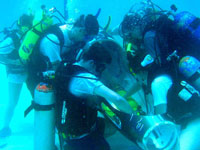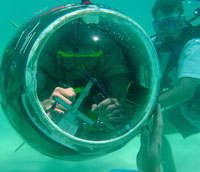Record high admissions posted againAdmissions officers reported that 18,800 undergraduate applications were processed this year, surpassing last year's record of 18,400. In addition, a record number of applications were received online this year, 60 percent versus 35 percent last year. Bolstering efforts to increase campus diversity, the number of African Americans accepting admission offers increased more than 40 percent from last year. Karen Torgersen, director of undergraduate
admissions, credits the interest in Virginia Tech to several
factors, including its football successes and emphasis on
technology. Tech was ranked 26th in the latest listing of top
national public institutions in U.S. News and World
Report, up from 28th. Institute for Information Technology establishedCiting Virginia Tech's leadership in information technology (IT) and the need to coordinate the university's many IT programs, President Charles Steger announced the formation of an Institute for Information Technology. The institute's main focus will include professional and continuing education, business/technology assistance, research program development, entrepreneurship, seminars and workshops, and strategic partnerships. Until a permanent director is named, the institute will be directed by Leonard Ferrari, vice provost for special initiatives. Pamplin launches dual-degree programVirginia Tech's Pamplin College of Business has established a dual-degree program with Institut National des Télécommunications (INT) in Evry, France, allowing students to earn an M.B.A. from Pamplin and a master of science in international management from INT. Students can earn the degrees in less time than earning them separately, and to do so they must qualify for admission to both schools, complete three semesters of full-time academic work at Pamplin and two at INT, and undertake a "significant internship." In 1998, the college made a deal with
Thunderbird University in Glendale, Ariz., that allows students to earn
a Pamplin M.B.A. and a Thunderbird master of
international management.
Fraternity fundraiser benefits MCEAPSigma Alpha Epsilon fraternity, in conjunction with Residential and Dining Programs, raised more than $17,950 as part of the Flex Out Hunger Program for the Montgomery County Emergency Assistance Program's (MCEAP) food bank. One of the most successful student philanthropy events in campus history, Flex Out Hunger allows students to donate their leftover flex meal plan dollars to MCEAP. The fraternity, which dedicated a total of
2,660 hours preparing, publicizing, and running the event, set
up tables outside the dining halls to talk with students.
President Charles Steger, Assistant Vice President for
Student Affairs Edward Spencer, several football
players, cheerleaders, and the Hokie Bird all showed up in
support of the event.
Libraries' program takes top awardThe University Libraries' Staff Training and Development Program has received the SOLINET Outstanding Library Programs Award for Continuing Education and Staff Development from the Southeastern Library Network Inc. Judges look at the project's effective use of resources, innovation, impact on the target population, and potential for replication by other libraries or consortia. Judges were impressed with Tech's program for its thorough training of more than 150 faculty and staff, its consulting with local faculty and community experts as well as commercial training services, and its wide spectrum of workshops and training opportunities.
College of Natural Resources honoredThe Nature Conservancy of Virginia honored the College of Natural Resources with its 2001 Partnership Award for the college's commitment to protect biodiversity as reflected in its continued relationship with the conservancy. Fourteen members of the college's faculty are or have been engaged in projects with The Nature Conservancy for the past 17 years. GM, Tech make $4.8 million dealGeneral Motors Corporation (GM) awarded the Virginia Tech
Transportation Institute (VTTI) a long-term research and product
testing agreement to examine various aspects of
driver-vehicle interfaces for collision warning and
telematics systems. The largest corporate-sponsored research
in VTTI's history, with a possible eventual total of $4.8
million, the agreement provides for individual projects over
a three-year period that will heavily utilize the
Virginia Smart Road and VTTI's instrumented vehicles fleet. Tech to research diabetes, breast cancerThanks to grants from Virginia's Commonwealth Health Research
Board (CHRB), Virginia Tech will start two new
research projects on Type 2 diabetes and breast cancer.
Both projects will take advantage of Virginia Tech's
recognized strengths in the areas of biotechnology, health,
and plant and animal sciences. Glenda Gillaspy,
assistant professor of biochemistry, and collaborator Cynthia
Gibas, assistant professor of biology, are exploring the possibility
of a plant producing a human enzyme used in the treatment of diabetes. Barbara Davis,
an assistant professor in human nutrition, foods, and
exercise, is the lead investigator in a research project that will
test the usefulness of a new compound for the
treatment of breast cancer. To read more about the projects, go
to www.technews.vt.edu/Archives/2001/Jul/01243.html Zia receives Humboldt Research AwardRoyce Zia, professor of physics at Virginia Tech, recently won an Alexander von Humboldt Research Award for his work in the area of theoretical condensed matter physics, which focuses on the cooperative behavior in systems with large numbers of constituent particles. Zia, who uses a checkerboard and a computer to illustrate his research, is studying the statistical mechanics of driven diffusive systems. His goal is to understand how a variety of macroscopic states emerges from an ensemble of simple microscopic constituents. The Alexander von Humboldt Foundation, located in Germany, grants
up to 150 research awards annually to foreign
scholars with internationally recognized academic
qualifications. Award winners are invited to carry out research projects
of their choice in Germany.
Geologists learning uranium containment from natureProfessor of geological sciences A. K. Sinha
and doctoral student Jim Jerden are looking at a natural
system containing a uranium deposit as a unique geologic analog
for uranium-contaminated sites and nuclear waste
repositories. The Coles Hill uranium deposit in South
Central Virginia, discovered three decades ago, is possibly one
of the richest uranium deposits in the U.S. Considered
for mining, yet never developed, this site may yield
knowledge as a natural laboratory for radioactive waste
containment. The toxic uranium should, by all
indications, have migrated into the surrounding
environment because of a close water table, but it hasn't. Geologists
are hoping to discover what prevents the uranium
from traveling. So far they have discovered that high
phosphorus levels may play a key role in keeping the
uranium stationary. Rat race for nutritionRat genes could improve our Vitamin C intake. Craig Nessler, head of plant physiology, pathology, and weed science, has found that transferring rat genes into lettuce can radically increase its Vitamin C content, up to 700 percent so far. He explains that rodents, unlike humans, never lost the ability to make their own supply--hence the reason that while sailors were plagued with scurvy en route to the New World, rats were not. Scientists believe that if they can increase the amount of Vitamin C--which can be used as a preservative--in lettuce, it will last longer, but they admit they don't expect people to eat rat-enhanced salads. Nessler does hope, however, that his research will result in other ways to induce production of the vitamin in crops to improve worldwide nutrition and prevent age-related dementia. Morris' NSF CAREER Award garners $502,000 John R. Morris, assistant professor of chemistry at Virginia Tech, has received a 2001 National Science Foundation CAREER Award, meant to encourage outstanding young researchers in their work, for $502,000 over five years. Morris earned the award with his project on "Reaction Dynamics of Hydrogen Halides on OH-Functionalized Surfaces and Development of Guided-Inquiry Experiments for Analytical Chemistry," which explores the chemical reactions that occur between acidic gas-phase molecules and the surfaces of water-coated materials. VBI named Center of ExcellenceSun Microsystems Inc. has selected the Virginia Bioinformatics Institute (VBI), housed at Virginia Tech, as a Sun Center of Excellence in Bioinformatics as a result of VBI's research programs, vision, and staff. VBI will receive more than $1 million in computational resources and support for post-doctoral research in a three-year partnership. Virginia Tech's Department of Computer Science (CS) has research links with VBI, and as a partner in the Sun Center of Excellence in Bioinformatics, the department will receive support for its research in problem-solving environments in bioinformatics, an area in which VBI and CS faculty already collaborate. Civil War Center moving toward national prominence"One can never understand what the United States is until one understands what the Civil War was," says James I. Robertson Jr., Alumni Distinguished Professor of History and executive director of Virginia Tech's Virginia Center for Civil War Studies. Robertson and William C. Davis, professor of history and director of programs for the center, have immersed the center in projects that help explain the war and its aftermath. Educating the young is one of their chief goals, which is why both nationally noted Civil War authors wrote the script for two videos on West Virginia as a Child of the Civil War, now being distributed to every fourth and seventh grade and every public library in West Virginia. The center will also sell the videos, which were underwritten by the Hugh I. Shott Jr. Foundation and produced by Greystone Communications in North Hollywood.
Davis says the center will continue its Virginia Tech Civil War Weekend and Campaigning with Lee events while lining up additional conferences and symposia. "While battles dominate the study of the Civil War," Robertson notes, "the major concentration at our Civil War center is on the factors that brought war and on the people who suffered from it. Through our library holdings and productions, we continue to strive to become the major source for Civil War history in the nation." For more information, go to www.civilwar.vt.edu. |





